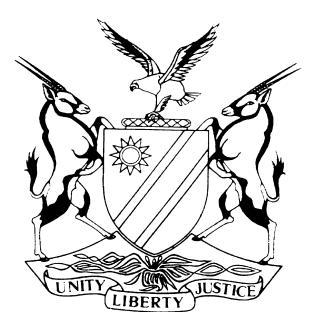4
REPUBLIC OF NAMIBIA

IN THE HIGH COURT OF NAMIBIA NORTHERN LOCAL DIVISION, OSHAKATI
REVIEW JUDGMENT
Case Title: The State v Archelius Gawusab
| Case No.: CR 39/2022 Opuwo: OPU-CRM-372/2022 | |
Division of Court: Northern Local Division | ||
Heard before: Honourable Lady Justice Salionga J et Honourable Mr Justice Kesslau AJ | Delivered on: 07 September 2022 | |
Neutral citation: S v Gawusab (CR 39/2022) [2022] NAHCNLD 83 (07 September 2022) | ||
It is hereby ordered that:
| ||
Reasons for the order: | ||
KESSLAU AJ (SALIONGA J concurring): [1] The matter comes before this court on automatic review in terms of Section 302 of the Criminal Procedure Act 51 of 1977, as amended (the CPA). [2] The accused was charged in the Magistrates Court of Opuwo with the offence of theft. The accused plead guilty to the charge and, after questioning by the magistrate in terms of section 112(1) (b) of the CPA, was convicted. The accused was thereafter sentenced to a fine of N$ 2 000 or twenty-four months imprisonment. [3] My query to the magistrate was the following: ‘The accused, early in his plea of guilty, indicated that he mistakenly used the money as he thought it was his, thus denying the intention to steal. Why did the learned Magistrate proceed with questioning instead of entering a plea of not guilty in terms of Section 113 of the Criminal Procedure Act 51 of 1977?’ [4] The magistrate replied that: ‘The learned Magistrate hereby replies to the Honorable Judges query that, as the plea questioning went further the accused admitted having intention to permanently deprive the lawful owner of the money and the learned Magistrate was satisfied that was essential thus a pea of guilty was recorded’ (sic). [5] With all due respect, the reply does not address the query. The relevant part of the questioning went as follows: ‘Q: What did you do to be guilty to the charge? A: I am guilty because I used an amount of N$ 2040 that belongs to Dion. Q: What do you mean you use it? A: I took it unlawfully without his consent. Q: Why did you took this money from Dion without his consent? A: I used my sim card in his cellphone and his cellphone takes two sim cards, while I was using his cellphone a certain amount of money came in and I thought it was for my sim card and that how it ended here. After I withdraw the money after certain days, I was informed that Dion received an ewallet the day I was using his cellphone and that it was his ewallet.’ The accused went on to explained that he thought it was send to his number and that he was expecting an electronic payment at the time from a friend. [6] The accused thus very early on during questioning denied the intention to steal as he mistakenly believed that he was entitled to the money. The magistrate, by then realised that the accused is offering a possible defence, instead of entering a not guilty plea in terms of Section 113 of the CPA, then started repeating her line of questioning with ‘Why are you pleading guilty?’ The questioning that follows reminds one more of those found during cross-examination by a prosecutor than the neutral questions expected from a judicial officer. [7] Section 113 of the CPA reads that: ‘If the court at any stage of the proceedings under section 112 and before sentence is passed is in doubt whether the accused is in law guilty of the offence to which he has pleaded guilty or is satisfied that the accused does not admit an allegation in the charge or that the accused has incorrectly admitted any such allegation or that the accused has a valid defence to the charge, the court shall record a plea of not guilty and require the prosecutor to proceed with the prosecution. . .’ [8] Basic principles governing questioning by a magistrate in terms of section 112(1)(b) were mentioned in S v Pieters1 as: ‘Firstly, s 112(1)(b) does not entitle the court to cross-examine an accused person. . .Secondly, leading questions should as far as possible be avoided. . .Thirdly, in questioning an accused person in terms of s 112(1)(b) a court should bear in mind the right of an accused person, in terms of the Constitution, to be presumed innocent as well as the right to a fair trial before an independent and impartial court.’ [9] In S v Gases2 it was determined that a failure of the trial court to enter a plea of not guilty in terms of the provisions of section 113 of the CPA when required to do so, amounted to a material misdirection that invalidates the plea of guilty. [10] When considering the proceedings in conjunction with the above principles, it cannot be certified that it was in accordance with justice and will have to be set aside. [11] In the result the following order is made:
| ||
Judge(s) signature | Comments: | |
KESSLAU AJ: | None | |
SALIONGA J: | None | |
1 S v Pieters 2014 (3) NR 825 (HC) at p 829 par 14-19
2 S v Gases 2016 (4) NR 980 (HC)